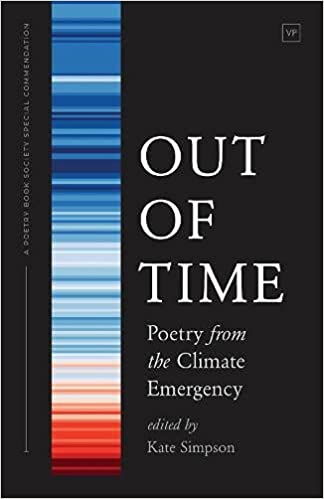REVIEW:‘OUT OF TIME
POETRY FROM THE CLIMATE EMERGENCY’ ANTHOLOGY
Reviewed by Stella Backhouse

Making poetry about climate crisis and environmental emergency is challenging. Nature is of course an age-old fount of poetic inspiration; but the whole point of the pastoral tradition is to help us to articulate nature’s beauty. Poetry devoted to environmental spoliation and the ugliness in its wake could be seen as inimical to the very purpose poetry is meant to serve. Added to that is the difficulty of conceptualising, in conventional language and form, our responses to something as psychologically shattering as the end of Earth as a life-sustaining entity. The result is a subject that tests artistic endeavour to its limits. It’s also one that, even as it unfolds around us, many of us simply cannot bear to acknowledge.
Like any anthology, Out of Time – Poetry from the Climate Emergency validates a variety of approaches. Emotional responses such as exhaustion, frustration, fear and visceral howls of pain sit alongside ‘What I’m Making With The World’, Cath Drake’s wry, dispassionate analysis of how we got into this mess. Lines like “I’m making a handbag out of the hide of the world./I’ve been hunting for something contemporary, unique” encapsulate the casual attitude to rape of the planet for short-term gratification that flows from our conceptualisation of ourselves as outside nature.
In ‘Morality Play’ meanwhile, Caroline Bird uses surrealist narrative to convey our psychic refusal to accept the reality of the climate emergency: “She said…‘I’m/not sure the world is real. Which makes it really hard to/give a shit about recycling’”. In ‘Void’, Astra Papachristodoulou experiments with form to portray a rubbish dump earth: “Once soil, once uncanny–given proximity/brought into the present. Spread over a hundred acres, with trucks and bulldozers scurrying like ants”. Others are more direct: “Fuck Humanity I want to bellow/” (Inua Ellams,‘Fuck/Humanity’).
A number of poets develop Ellams’ sentiment by symbolically wresting the voice away from the human, allowing nature to vent its fury, mourning and grief. In his coruscating ‘Red River at the A30 Culvert’, John Wedgwood Clarke has the river rage that ‘you/cast me away like rubbish as if/I were not a part of you. How you shove me/under, naked, a dying river god’. ‘A Polar Bear in Norilsk’ by Sue Riley combines a concrete poetry representation of disintegrating sea ice with a restive, unresolved anaphora around the word ‘if’: “if I could walk on ice smell the sea/if I had not turned away set out searching/if I had strength”. The bear’s blaming of itself for its disorientation and sadness is particularly affecting.
But this is not an irredeemably bleak read. In the final three sections, ‘Work’, ‘Transformation’ and ‘Rewilding’, poets look to the future and try to find hope. But with problems of this magnitude, there are, inevitably, no easy ways out. Inua Ellams warns that even potential solutions may simply create new problems (“think…vegan avocado diets and deforestation/phones to connect our lonely spirits and Black bodies in coltan mines”) while Pascale Petit (‘#ExtinctionRebellion’) envisages an anodyne, hybridised future where technology comforts us with a faint simulacrum of the bounty we’ve squandered: “everyone will hold leaves/intently as smartphones/to hear them retweet birdsong/from archives.”
Inevitably, some of the deepest distress is evoked by dread for the future of our children. For Jemma Borg (‘Unripe’), the debate is around how much her son needs to know: “I can’t tell him what I see with my eyes closed – so many mouths pushing up against/the dry earth”; for Mariah Whelan (‘Geography Lessons’), it’s about equipping tomorrow’s policy-makers with the right skills: “I don’t want them to be afraid/because there’s no time left. I give them transferable skills: tools and units/to measure systemic collapse”; for Anthony Anaxagorou (‘Nautical Almanac’), it’s about whether today’s children will remember the world that used to be.
The anthology is prefaced by a quote from climate activist Greta Thunberg. She said “We are now at a time in history where everyone…must speak out. In clear language”. The paradox is that language is all we have; but at the same time, the trauma we face is so deep it may defy expression. In bringing those two realities together, Out Of Time is taking poetry to new places and opening up new spaces for sharing what we know. We so need it.
Out of Time: Poetry From the Climate Emergency can be purchased online for £12.99 from the Valley Press website.
